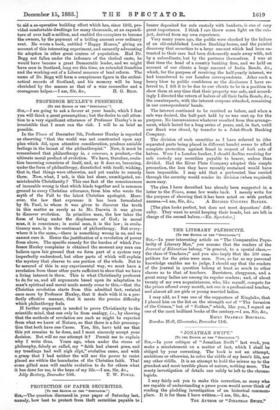PROFESSOR HUXLEY'S PESSIMISM.
[To THE EDITOR or THE "SrECrAToa."1
SIR,—I am going to ask a favour at your hands, which I fear you will think a great presumption; but the desire to call atten- tion to a very significant utterance of Professor Huxley's is so irresistible that I must run the risk. I will be as brief as possible.
In the Times of December 7th, Professor Huxley is reported -as observing "that the world was not constructed upon any -plan which did, upon attentive consideration, produce amiable feelings in the breast of the philanthropist." Now, it must be Temembered that philanthropy is, e concesso, a product,—the ultimate moral product of evolution: We have, therefore, evolu- tion becoming conscious of itself, and, as it does so, becoming, -under the form of philanthropy, dissatisfied with itself; wishing, that is, that things were otherwise, and yet unable to remedy them. Now, what, I ask, is this but sheer, unmitigated, no- -mistakeable Christianity ? This one fact of the consciousness -of incurable wrong is that which binds together and is common ground to every Christian utterance, from him who wrote the myth of the Fall to the latest Christian apologist. More- -over, the law that expresses it has been formulated by St. Paul, to whom it was given to discover the truth in this matter as surely as to Mr. Darwin it was given to discover evolution. In primitive man, the law takes the form of being under the displeasure of God; in moral man, it is conscience; in social man, it is the law ; in evolu- tionary man, it is the sentiment of philanthropy. Bat every- -where it is the same,—there is something wrong in us, and we -cannot cure it. Hence the justification of a revelation of power from above. The specific remedy for the burden of which Pro- fessor Huxley complains is obtained the moment any man can 'believe upon fair ground that we form part of a system very imperfectly understood, but other parts of which will explain the mystery that cleaves to one portion of the whole. But to -be assured of this in any experimental way, we must have a revelation from those other parts sufficient to show that we have a living interest in them. This is what Christianity professes -to do for us, and all arguments based upon its adaptation to man's spiritual and moral needs merely come to this,—that the -Christian revelation starts from this admitted fact, restated -once more by Professor Huxley, that it deals with it in a per- fectly effective manner, that it meets the precise difficulty -which philanthropy feels.
If further argument is needed to prove Christianity to the .scientific mind, that can only be from analogy, i.e., by showing that the methods of revelation are such as might be expected -from what we know of Nature, so that there is a fair presump- tion that both have one Cause. Yon, Sir, haw told me that this yet remains to be done, and I most sincerely accept your -decision. But will no one attempt it? Permit me to explain why I write thus. Years ago, when under the stress of
philosophy, falsely so called, my " faith had almost gone, and treadings had well nigh slipt," evolution came, and with -a grasp that I had neither the will nor the power to resist placed me within the boundaries of the Christian faith. That :some gifted man will enable evolution to do for others what
it has done for me, is the hope of my life.—I am, Sir, &c.,










































 Previous page
Previous page